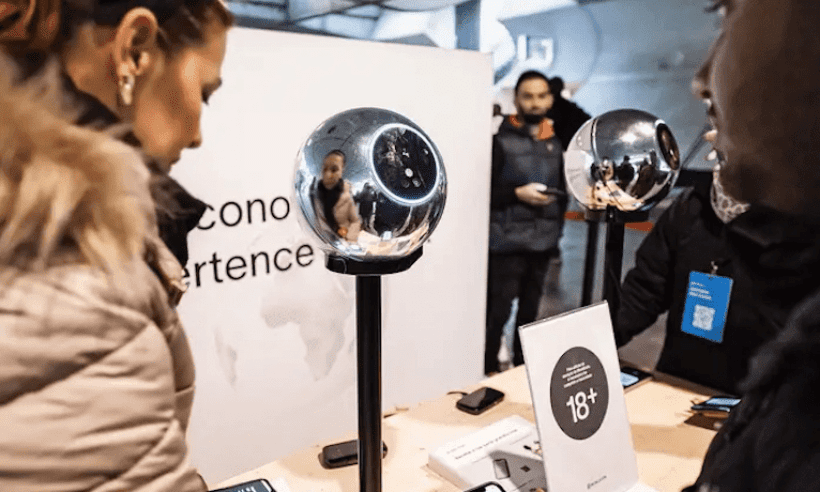Worldcoin Arrives In Cartagena, Colombia Under Ethical And Regulatory Cloud
On August 20, Worldcoin began offering its verification services in Cartagena, allowing residents over 18 to obtain a World ID. This digital ID is designed to confirm that users are human, distinguishing them from AI entities without revealing personal information. According to Worldcoin, more than 6 million people globally have undergone this verification process, and 12 million have downloaded the World App, the platform’s associated digital wallet.
The process involves using a device called the Orb to capture detailed images of users’ irises, which are then used to create a unique World ID. While Worldcoin assures that these images are deleted after registration, the potential for data abuse remains a significant concern. There are also fears that the program could exploit vulnerable populations, who might participate in the scheme without fully understanding the risks involved or because they lack access to alternative financial and digital services. Worldcoin has already attracted negative attention for focusing on poor and developing countries and regions for its data collection efforts, where it pays participants a small sum to participate. For example, the company has launched in Cartagena, a Colombian city with a luxurious tourist zone serving both Colombians and international visitors, but also where the majority of the city is both impoverished and crime ridden.
“We want all Colombians to have the tools to prepare for the era of artificial intelligence, so just 45 days after the arrival of Worldcoin in Colombia, we are pleased to make the project’s humanity verification services available to all Cartageneros,” said Martin Mazza,regional manager for Latin America at Tools for Humanity (TFH).
Tools for Humanity (TFH) is the company behind the development and deployment of the Worldcoin project. It supports the technical and operational aspects of Worldcoin, working on the creation and maintenance of the necessary infrastructure, such as the Orb devices used to capture iris scans. TFH collaborates with Worldcoin in building the broader digital and financial network that the project envisions.
In summary, Worldcoin is the project, while Tools for Humanity (TFH) is the company that manages and implements the project’s technical and operational components.
Sensitive data, as defined by the Colombian Constitutional Court in its 2011 ruling (Sentencia C-748), includes information that is closely tied to an individual’s privacy and human dignity.
Colombian government initiates formal proceedings against Worldcoin
The Colombian Superintendency of Industry and Commerce (SIC) has initiated formal proceedings against Worldcoin Foundation and Tools for Humanity Corporation, citing potential violations of the country’s data protection laws. The investigation, outlined in Resolution 46436 of 2024, addresses concerns over the companies’ practices related to the collection and use of sensitive biometric data, specifically iris scans, in exchange for cryptocurrency payments.

If found in violation, Worldcoin may face significant penalties, including the suspension of its operations in Colombia
Worldcoin, a platform that offers digital identity verification through iris scanning, claims its service helps distinguish humans from bots, allowing users to access various online services. The system generates a “World ID,” which users can download and use across multiple platforms. The organization also enables third-party developers to integrate World ID into their own applications without prior approval from Worldcoin, raising additional privacy concerns.
The SIC’s investigation focuses on whether Worldcoin’s data collection practices comply with Colombia’s data protection regulations. Key issues under scrutiny include whether users were provided with clear, transparent, and informed consent prior to data collection and whether adequate procedures were in place to protect individuals’ rights under the country’s habeas data framework. This legal principle, enshrined in Colombian law, guarantees the right to privacy and the proper handling of personal data.
If the investigation confirms that Worldcoin violated these regulations, the companies could face significant penalties. Possible sanctions include fines of up to 2,000 monthly minimum wages, suspension of activities for up to six months, or even the permanent closure of operations, as stipulated in Article 23 of Law 1581 of 2012.
The SIC has also issued a reminder to the public to exercise caution when sharing personal data, particularly sensitive information like biometric data. The ongoing investigation underscores the importance of protecting personal information in an era where digital services increasingly rely on such data.
Sensitive data, as defined by the Colombian Constitutional Court in its 2011 ruling (Sentencia C-748), includes information that is closely tied to an individual’s privacy and human dignity. While the processing of such data may sometimes be necessary for essential services like healthcare or education, misuse of sensitive information can lead to significant risks, including discrimination against the data subject.
The investigation remains in its early stages, and the decision is currently pending notification. No appeals are permitted against this decision.
Photos courtesy Tools For Humanity

























